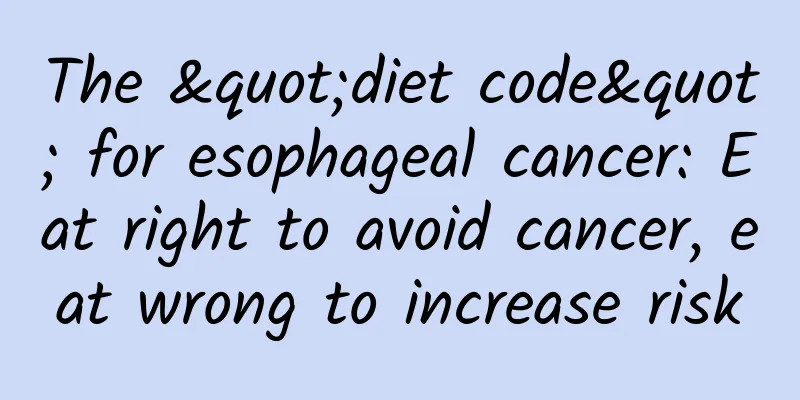The "diet code" for esophageal cancer: Eat right to avoid cancer, eat wrong to increase risk

|
Author: Ren Qingling Unit: Shanxi Bethune Hospital Among all types of cancer, the danger of esophageal cancer should not be underestimated. It not only causes unbearable dysphagia to patients, but also seriously affects nutritional intake as the disease progresses, causing rapid weight loss and weakness, greatly reducing the quality of life. Moreover, the treatment process of esophageal cancer is complicated and painful. Surgery, radiotherapy, chemotherapy and other treatment methods are often accompanied by many side effects, causing double torture to the patient's body and mind. What is even more worrying is that if it is not discovered in time, the five-year survival rate of esophageal cancer is relatively low, which seriously threatens life safety. The incidence of esophageal cancer is inextricably linked to our daily diet. Bad eating habits are like a "time bomb" hidden in the dark, silently laying the hidden dangers for the occurrence of esophageal cancer. Today, let us unveil the "traffic lights" in the diet of esophageal cancer and use the right diet to protect our health. Esophageal cancer "dangerous food list" Over-scalding food: the "invisible killer" of the esophagus Many people love hot soup and hot tea right out of the pot, and think that they are more delicious when eaten while hot. However, the esophageal mucosa is extremely delicate and can only withstand temperatures of 50℃ - 60℃. Once this range is exceeded, it will be burned. Imagine that the esophageal mucosa is repeatedly damaged and repaired under such "high temperature torture" for a long time, which will cause the esophageal mucosal cells to mutate and increase the possibility of cancer cells. Just like hot porridge just out of the pot and steaming Kung Fu tea just brewed, they seem to be ordinary delicacies, but if you don't pay attention to the temperature, they may become the "culprit" of esophageal damage. Therefore, for the health of the esophagus, patiently waiting for the food to cool down is a simple but key step to prevent cancer. Pickled food: "Carcinogenic factors" hidden in deliciousness Pickled foods such as pickles, bacon, and salted fish have a place on the table with their unique flavor. However, during the pickling process, they produce a large amount of nitrite. After nitrite enters the human body, it will be converted into nitrosamines under certain conditions, which are notorious strong carcinogens. Long-term consumption of pickled foods will undoubtedly create conditions for the occurrence of esophageal cancer. For the sake of health, we must control the frequency and amount of pickled food intake, choose more fresh ingredients, and let the table return to its original freshness and health. Spicy food: the irritant of the esophagus Spicy foods such as spicy hot pot, chili peppers, mustard, etc. can instantly ignite the taste buds and bring a refreshing sense of stimulation. But for the esophagus, they are extremely irritating "dangerous elements". Excessive consumption of spicy foods will cause strong stimulation to the esophageal mucosa and cause inflammation. Under the repeated stimulation of inflammation for a long time, the cells of the esophageal mucosa are prone to lesions. Especially for people whose esophagus is more fragile, they should stay away from such foods and create a gentle and comfortable environment for the esophagus. Moldy food - a "poison" that cannot be ignored Moldy foods, such as moldy grains and nuts, often contain aflatoxin, which can not only reduce nitrates to nitrites, but also promote the synthesis of carcinogens such as nitrosamines. Eating moldy foods will expose the esophageal mucosa to these carcinogens for a long time, increasing the incidence of esophageal cancer. Even if you accidentally eat a small bite of moldy food, it may bring huge hidden dangers to your health without knowing it. Therefore, once you find signs of mold in food, even if it is only slight, you must resolutely discard it and never damage your health because you are reluctant to discard it. Alcohol: A Corrosive Agent for the Esophagus Alcohol has a direct irritating and corrosive effect on the esophageal mucosa. Long-term heavy drinking will cause the esophageal mucosa to be constantly eroded by alcohol, making it fragile and increasing the risk of esophageal cancer. Whether it is liquor, beer or red wine, excessive drinking may become an "accomplice" in damaging the esophagus. For the sake of esophageal health, drinking must be moderate. Barbecue food: the "health killer" behind the delicious food The unique aroma and taste of barbecued food are always hard to resist. Whether it is grilled lamb kebabs, grilled chicken wings, or grilled vegetables, they are all popular among the public. However, during the barbecue process, meat will undergo a series of complex chemical reactions at high temperatures, producing carcinogens such as polycyclic aromatic hydrocarbons, which can damage the DNA of esophageal mucosal cells, causing cell mutations and increasing the risk of esophageal cancer. Moreover, when the food is burnt or burnt, the content of carcinogens will be higher. In addition, condiments such as cumin and chili peppers commonly used in barbecue can also irritate the esophageal mucosa, further increasing the risk of esophageal lesions. Therefore, although barbecue is delicious, you must eat less for the sake of your health. "Healthy Eating Guidelines" to Protect the Esophagus Fresh fruits and vegetables: a protective shield for the esophagus Vegetables and fruits are rich in nutrients such as vitamins, minerals and dietary fiber, and can be called a "protective shield" for esophageal health. Antioxidants such as vitamin C, vitamin E and beta-carotene can effectively remove free radicals in the body, reduce cell damage and reduce the risk of cancer. Broccoli is rich in a variety of anti-cancer ingredients, and the carotene in carrots can be converted into vitamin A in the body, which is very beneficial for maintaining the health of the esophageal mucosa; oranges, apples and other fruits are rich in vitamins and pectin, which help promote digestion and excrete harmful substances. It is recommended to consume no less than 500 grams of fresh vegetables and 200-350 grams of fresh fruits every day to keep the esophagus nourished at all times. High-quality protein food-a "little helper" for esophageal repair Protein is an indispensable nutrient for the body to repair and maintain normal physiological functions. A moderate intake of high-quality protein foods, such as lean meat, fish, eggs, beans and dairy products, can provide sufficient "raw materials" for the repair and renewal of the esophageal mucosa and enhance the resistance of the esophagus. For example, fish is rich in high-quality protein and unsaturated fatty acids, which are easy to digest and absorb; eggs are a comprehensive source of high-quality protein. Eating an egg a day can supplement the body with necessary nutrients. Drinking a glass of milk and eating some bean products every day can also help esophageal health. Whole grain foods: a good partner for esophageal health Whole grain foods such as brown rice, oats, and whole wheat bread are rich in dietary fiber and a variety of nutrients. Dietary fiber can promote intestinal peristalsis, speed up food digestion and excretion, and reduce the time that harmful substances stay in the intestines, thereby reducing the adverse effects on the esophagus. At the same time, the nutrients such as B vitamins and minerals in whole grains help maintain the body's normal metabolism and play a positive role in preventing esophageal cancer. We can replace some refined rice and white flour with whole grain foods to make the diet healthier and more balanced. Foods rich in B vitamins - the "guardian" of the esophageal mucosa B vitamins are essential for maintaining the integrity of the esophageal mucosa. Foods such as animal liver, lean meat, whole-wheat products, and yeast are rich in B vitamins. When the body lacks B vitamins, the esophageal mucosa is prone to lesions. Appropriate intake of these foods can provide the esophageal mucosa with the necessary nutritional support and enhance its ability to resist diseases. Diet is the key line of defense against esophageal cancer The incidence of esophageal cancer is closely related to diet. Improper eating habits may become the "trigger" of esophageal cancer, while a scientific and reasonable diet is a solid line of defense to prevent esophageal cancer. By staying away from overscalding, pickled, spicy, irritating, moldy, and grilled foods, controlling alcohol intake, and eating more fresh fruits and vegetables, high-quality protein foods, whole grain foods, and foods rich in B vitamins, we can greatly reduce the risk of esophageal cancer. Let us start from now on, pay attention to every meal and every bite of food, use a healthy diet to build a safety barrier for the esophagus, protect the "life channel" of our body, and embrace a healthy and beautiful life. |
<<: AIDS "Functional Cure": Medical Exploration Started from the First Case in France
>>: Stress and the GI tract: How to protect your digestive system in a fast-paced life
Recommend
What should I do if my period is often delayed?
It is normal for menstruation to be delayed or ad...
How accurate is Down syndrome screening?
Pregnant mothers who have some knowledge of Down ...
What causes gynecological cysts?
As life becomes more and more busy, everyone is c...
Sales volume drops, and people are abandoned! Why are fewer and fewer people eating instant noodles?
Review expert: Wang Xuejiang, professor of pathop...
Is it OK to have sex before hysterosalpingography?
Hysterosalpingography is a common examination met...
The labia minora has a pointed bud for two years
If a woman has many small granulations on her lab...
What is the crust type of the Qinghai-Tibet Plateau? Which two plates formed the Qinghai-Tibet Plateau?
The Qinghai-Tibet Plateau has strong radiation, a...
Causes of dysmenorrhea in unmarried women
Many women suffer a lot when their menstruation c...
What medicine is good for women with kidney deficiency?
When it comes to kidney deficiency, perhaps every...
What should I do if there are small particles under the vulva?
The female private reproductive organs are very i...
Don't delay if you have these 3 symptoms of hepatitis B
1. Abnormal liver function: If a hepatitis B pati...
How long will it take for the postpartum feeling to heal?
During pregnancy, the baby will always make the m...
Why can't I borrow money when I'm in trouble? Does it mean that I have bad character?
There are many reasons why people can't borro...
What to do if a pregnant woman has blood in her stool due to internal heat
If a pregnant woman has a sore throat and blood i...









